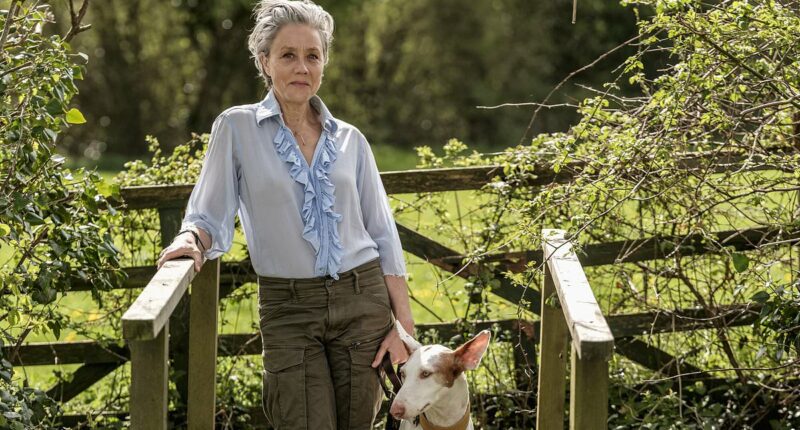Share this @internewscast.com
For nearly four decades, visiting my friends and family in the West Country was always delightful, but upon returning to London’s Paddington Station, the sight of graffiti-covered walls and looming tower blocks offered a familiar sense of comfort. It was home—at least it used to be.
I felt a sort of grief leaving the North Kensington neighbourhood I had spent 35 years getting to know and moving to Somerset 100 miles west.
But as I kept saying to myself, no one’s died and no one’s dying. Clearly, moving to the country was not the worst thing that could happen to me.
‘New beginnings,’ everyone said encouragingly. ‘Change is beneficial.’ ‘You’re going to love it.’ Even the Government seemed to endorse my decision, with their quarterly wellbeing statistics highlighting residents of the South West as the happiest overall. ‘Welcome! In the country, it only takes 20 years to be accepted,’ joked my friend Lucas, not entirely in jest.
Leaving London was not something I had envisioned; it was simply the lesser of several unfavorable options. After splitting with my partner of nearly 15 years, it was time for a change.
The breakup had been inevitable for a while, but I was still reeling from it. His disdain for me had become palpable, and unless you are remarkably resilient, recovering from such a situation takes time. As a single person, my disposable income for housing was significantly reduced, prompting me to confront financial realities. I examined housing options for myself and my dogs, Bufo and Leica, both sizeable podencos.
There were four options: a shabby inner-city dwelling but with a garden for the dogs; a dull suburban middle ground; relinquish the dogs for a better yet smaller flat; or relocate to the countryside. I chose the latter.
As I said, it seemed the least bad so, like lots of other people, I am an economic migrant to the country.

Kate Spicer moved to the Cotswolds after splitting with her partner of 15 years
Back in March, I rented a house in Bruton, a small town considered ‘desirable’ by estate agents. It’s a pleasant place, noted for its notable residents. Contrary to some stories, there are no Lamborghinis in the street, but there are plenty of former Londoners. As my friend Will mentioned when I told him about my move, it was ‘a safe and soft landing.’ Indeed, I felt secure joining Bruton’s other former city dwellers, known as DFLs (Down From London), some of whom I already knew. When I shared news of my move on social media, a disgruntled comment from someone clearly identifying as a local said, ‘just what we bloody need, another DFL’.
I was perfectly fine with this apparent insult. Yes, I’m a DFL. I’ve loved London life. From simple things such as twice-weekly bin collections to the glorious libraries, restaurants and royal parks, London is one of the world’s great cities. Even writing about leaving makes me feel a bit tearful.
Here in Bruton, the bin men take your recycling weekly and your actual rubbish only once every three weeks. Woe betide anyone (i.e. me) who regularly fails to put their wheelie bin out on the correct Monday. Your rubbish will stink by the next collection.
There was much to be happy about. I have triple the space I had in London, and a garden that gets sun all day in a picturesque town where everything is in walking distance. And summer is here. Life goes on. I’d make it work. Probably.
The days leading up to leaving London were so hectic I’d forgotten about a conversation from a few weeks previously with the landlady of my Somerset rental. She suggested I rent her other house, in another popular and larger Somerset town called Frome.
I told her I didn’t want to live in Frome, I wanted to live in Bruton – hence why I had rented the house from her. A house I had yet to sleep in despite having paid more than £5,000 in deposit and rent up front. All fairly standard for an ex-council house in this fashionable country town. I resented justifying my choice as she pushed me to consider ‘cooler’ Frome. No thanks, I had friends and family here, I wanted my niece and nephew to be able to visit me after school. I liked the surrounding swankiness that would lure my friends down from the city: a hotel with beautiful gardens called The Newt, a number of art galleries, including an internationally recognised one called Hauser + Wirth with gardens and sculptures and places to eat.
Then there were all the restaurants, Osip, the Old Pharmacy, Three Horseshoes, Higher Farm, Briar, At the Chapel, the Bradley Hare, to name a few.
And quite apart from this, Frome wasn’t ideal for my dogs because I’d have to use the car to take them for a half-decent walk.

Kate liked the surrounding swankiness that would lure her friends down from the city
This all came at a time when I was reluctantly packing up my possessions and shipping out to the sticks. I didn’t pay the right attention to what I was doing. Consequently, my new life in the country was a bit of a mess before I even arrived.
On the day I left London, the van went ahead and I followed. Before I’d even hit the M4, with my dogs curled up on a pile of clothes in the boot, my landlady rang from the estate agents where she was putting the house I’d rented six weeks ago up for sale.
Oh well. That’s her prerogative. It made me realise how much my circumstances had changed.
On important forms I tick the boxes marked ‘single’ and ‘tenant’ now, not ‘in a relationship’ and ‘homeowner’. Legally, and with only two-months notice, I could be homeless again if she sold the house. Just when I needed some security, it was gone.
The whiff of temporariness hung about me. I invited some family in Wiltshire up the road to visit but they said, quite reasonably, there didn’t seem much point if I wasn’t going to be there long. They’d come when I had a proper home. My Mum offered me some curtains. ‘Why bother?’ I asked.
Looking back, I did not arrive here in April feeling happy. More than four months after I moved in, there are still stacks of books, sad echo-y, half-empty rooms and full boxes, but I am now recovering a bit of joy.
Bruton seems quiet but it is a fun town. A quick glass of wine in both the nice middle-class pub and the other more earthy one can magic up some interesting people.
I’ve bumped into a couple of friends already. One, also post-divorce, has found herself an interesting local boyfriend.

Net migration from urban areas to rural areas, has been growing among every demographic except young adults aged 15 to 19 since 2020
Moving home after so long in one place is discombobulating. Unless you are some kind of Zen monk and unattached to all people, places and physical things, there’s a real feeling of loss not having the community and familiarity of the neighbourhood you know so well. The first time I went back to London, I welled up every time I turned down a familiar street. I was so happy to see everyone, and not just my friends. People I nearly hugged included the guy who runs the petrol station, staff in the coffee shop and my old dog walker – in fact all the familiar faces on every street corner.
It’s a strange comfort knowing I am not alone in this shift from urban to rural. Net migration from urban areas to rural areas has been growing among every demographic except young adults aged 15 to 19 since 2020, according to the Office for National Statistics (ONS).
The ONS data comparing rural and urban populations seems to sum up my ambivalence quite well. The suicide rate is higher in rural areas but rates of loneliness are lower. Crime rates are lower in rural areas but then again the broadband and phone reception can be diabolical. I mean, what’s the point in not getting your phone nicked if it doesn’t work anyway?
A really interesting 2017 study from the University of York found that the higher the air concentrations of nitrous oxide in the air was, the lower people felt their quality of life to be. The effect of polluted air on a person’s sense of wellbeing was ‘broadly comparable to that of many major life events such as unemployment, separation and widowhood’. Perhaps clean air might cheer me up a bit? In short, moving is a mix of good and bad.
People say I look jolly healthy and tanned. But I was consistently negative in my responses. ‘Probably all the clean air,’ I’d say, rolling my eyes. Or, ‘don’t worry, I’ll be pure leather by Christmas’.
I had a morose answer for everything. Bruton is, as one estate agent told me, a ‘trendy town’ with house prices to match. It’s unlikely I can afford to carry on living here in the style I’d like to. ‘Don’t worry,’ I told the troll on my Instagram account, ‘This DFL will be living in a wheelie bin in Wincanton come autumn.’
Thankfully, that wheelie bin can wait. My landlady recently told me she had decided to take the house off the market.
Perhaps it was time to count the blessings in my life and not the bum notes.
It was a London friend who told me I was sounding bitter, which I was offended by at first and then grateful to her for pointing out. Bitter isn’t a good look.
We create our own stories. I had to learn to look on the bright side. This was just life doing what it will: good sometimes; crap at others. My mum used to say: ‘Don’t pull that face, the wind will change.’ The same is true of moods and feelings. This country-living negativity had to stop before it became entrenched. It was time to take myself in hand.
I’ve become a bit more concerned about exercise. We know it is the single swiftest route to a better mood, alongside reducing drinking, eating a wholesome diet and increasing sleep.
On a Post-it note I’ve written the names of people I meet – Dylan the postman, Piers the landlord in the Blue Ball, Nicky, Jess and Angie in Rose and Lyons, the cute shop with the funny birthday cards. I try to be friendly and open-minded.
In computer games there is a phrase for the figures that stand around but can’t actually do anything. They are called Non-Player Characters, or NPCs. Younger generations use ‘NPC’ to describe anyone who is irrelevant, dull or unimportant. Not just in games, but in life. Bumbling round Bruton, I feel fully like an NPC.
I used to walk down the street in London like a madwoman, giving cheery waves to everyone. Here, and with two dogs for company, I realise how much those casual interactions formed my social world. No-one speaks on the phone any more, and living in the country means some people consider me to be out of the picture. It’s a little death.
Despite knowing full well the only thing to do is to get out there and meet people, I find myself reluctant to do so.
There’s something so easy about zoning out while weeding or raking dead grass out of the scrappy lawn in the rental property. After 40 years living in London apartments, even having a scruffy, balding lawn like this one is a genuine novelty.
Composting is a strange sort of pleasure. So is preserving grey water for the plants. Where is the sociable woman I once was?
Thank God this town still has proper pubs. That’s my biggest takeaway from the first four months living solo with my two dogs in the country.
Last week I walked to the Blue Ball to celebrate the end of another week here with a glass of rosé. A slightly squiffy but cheery and chatty lady came over and said: ‘Who are you? Why are you here?’ I admitted I wasn’t here in her ‘trendy town’ under dream circumstances. Why bother lying for a complete stranger?
‘Oh, don’t worry. I’ve never met anyone here who came down in dream circumstances,’ she said. Her ‘moving to the country’ story involved leaving a successful career because of Long Covid, motherhood and the burdensome cost of a half decent life in London.
‘You’ll get used to it. You’ll love it,’ she promised and showed me a website of her new company, which is growing into a great success apparently. ‘There are loads of interesting, fun and nice people here and lots of interesting women starting a second life.
‘In a year or two you won’t even miss the city.’
She’s not the first to say this to me. But I’m not there yet. For now, at least, I’ll just have to take her word for it.

















